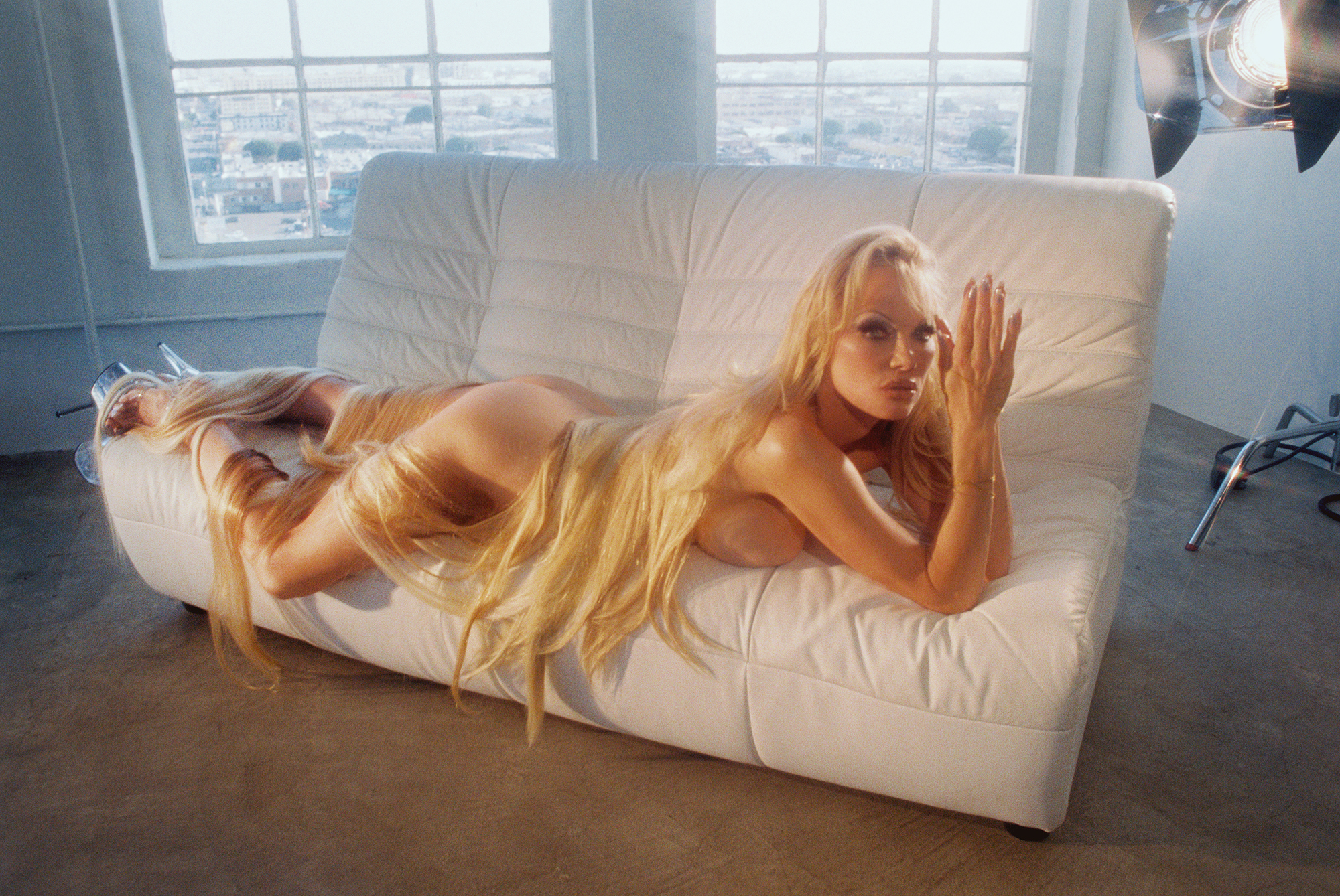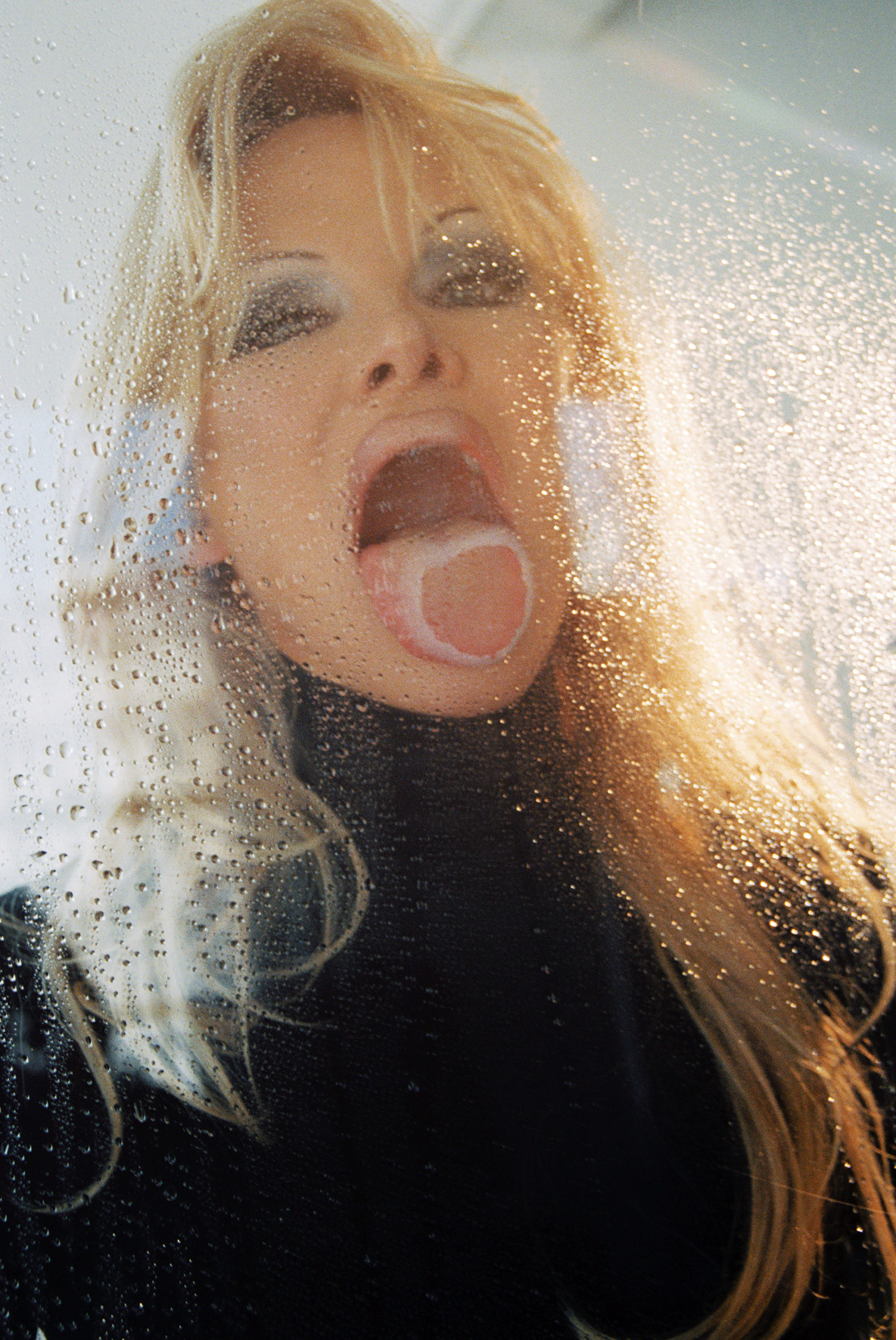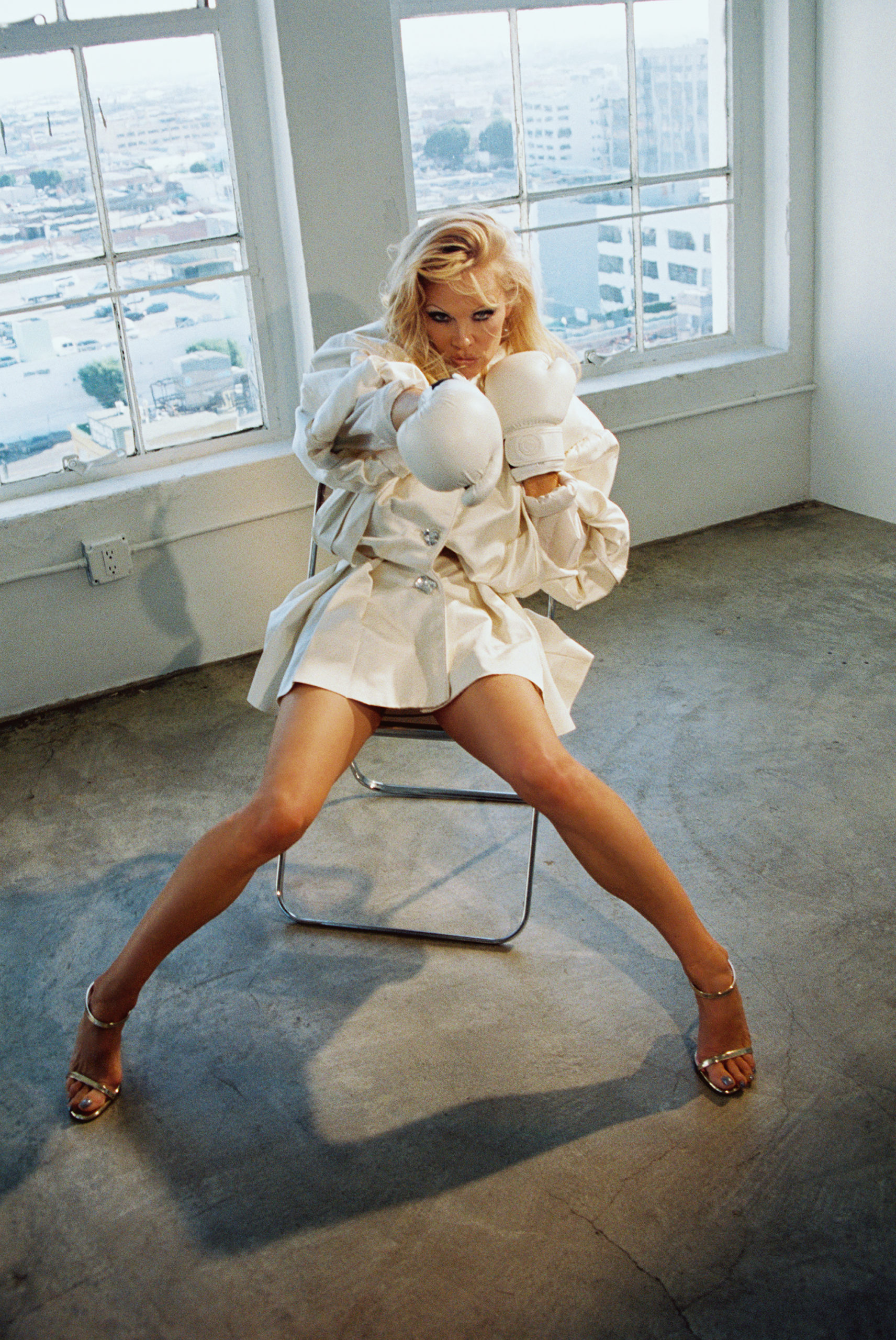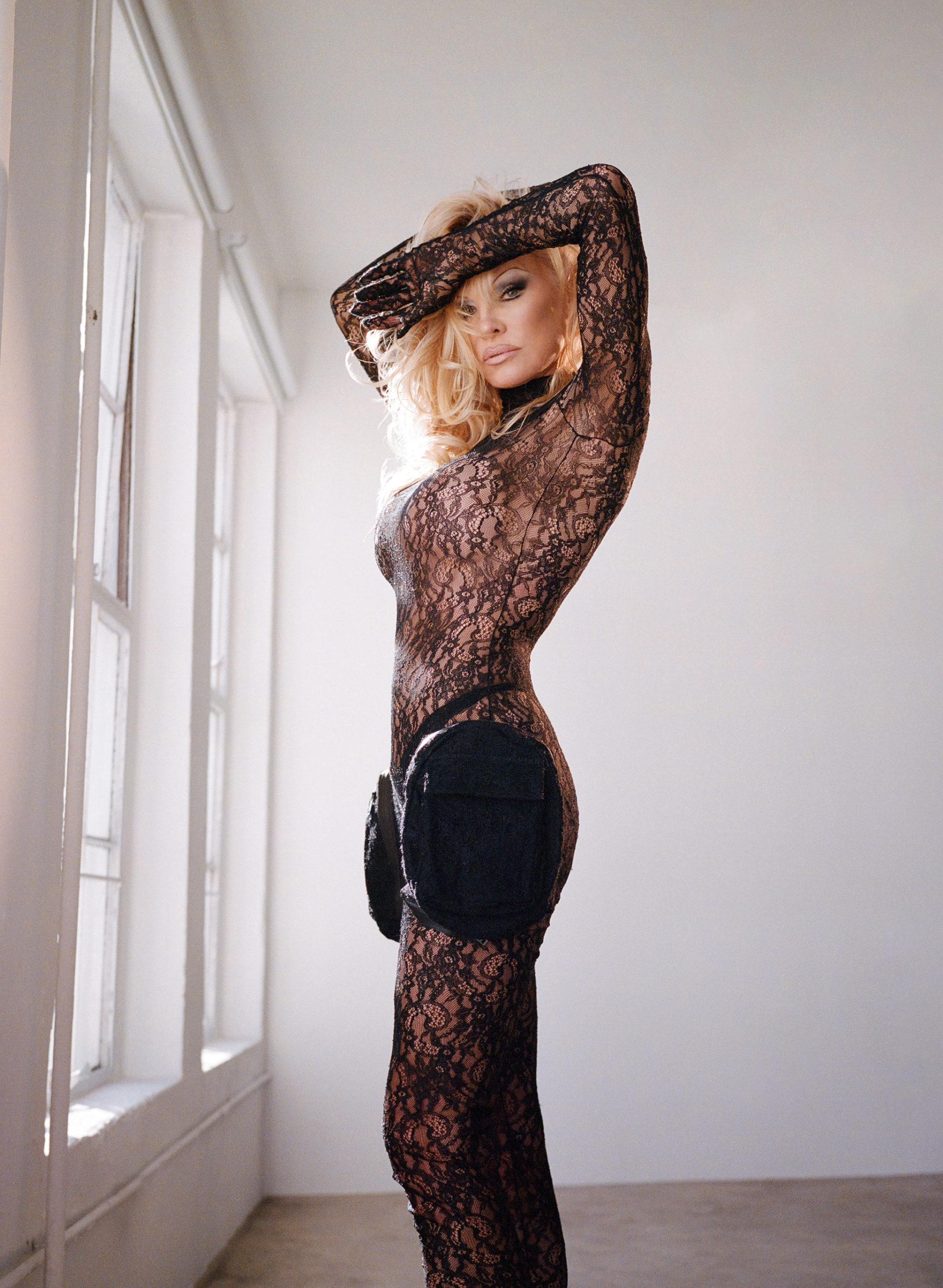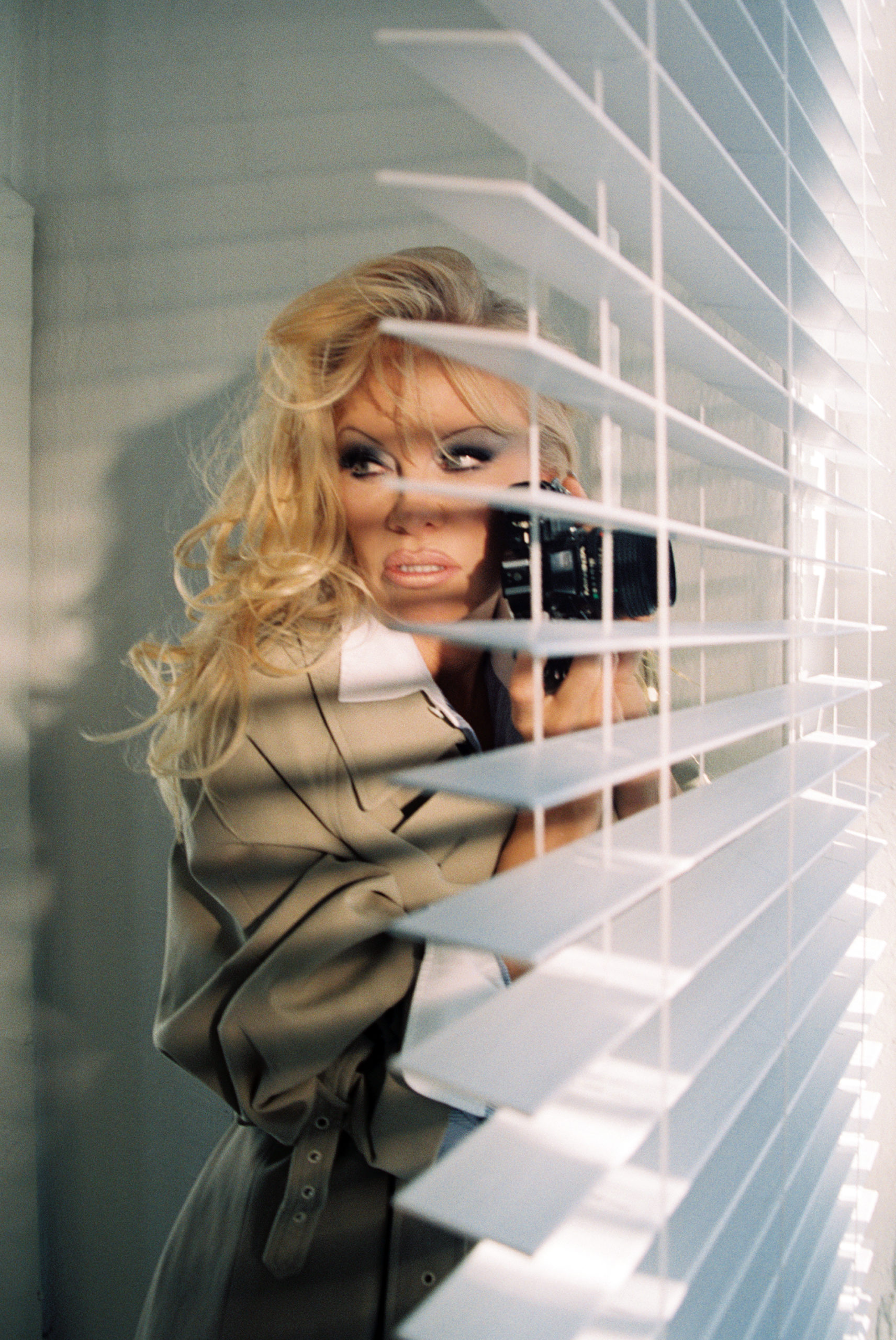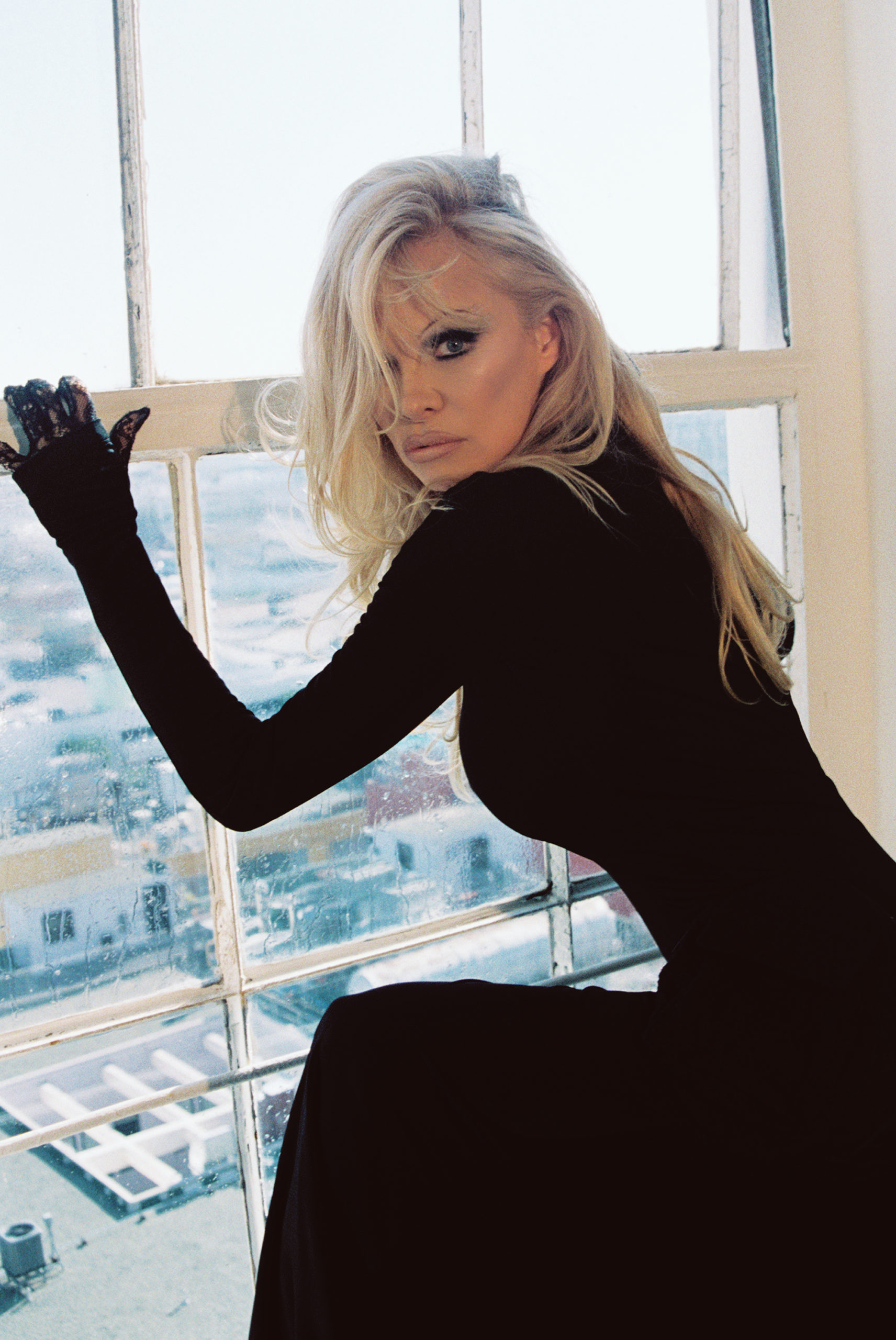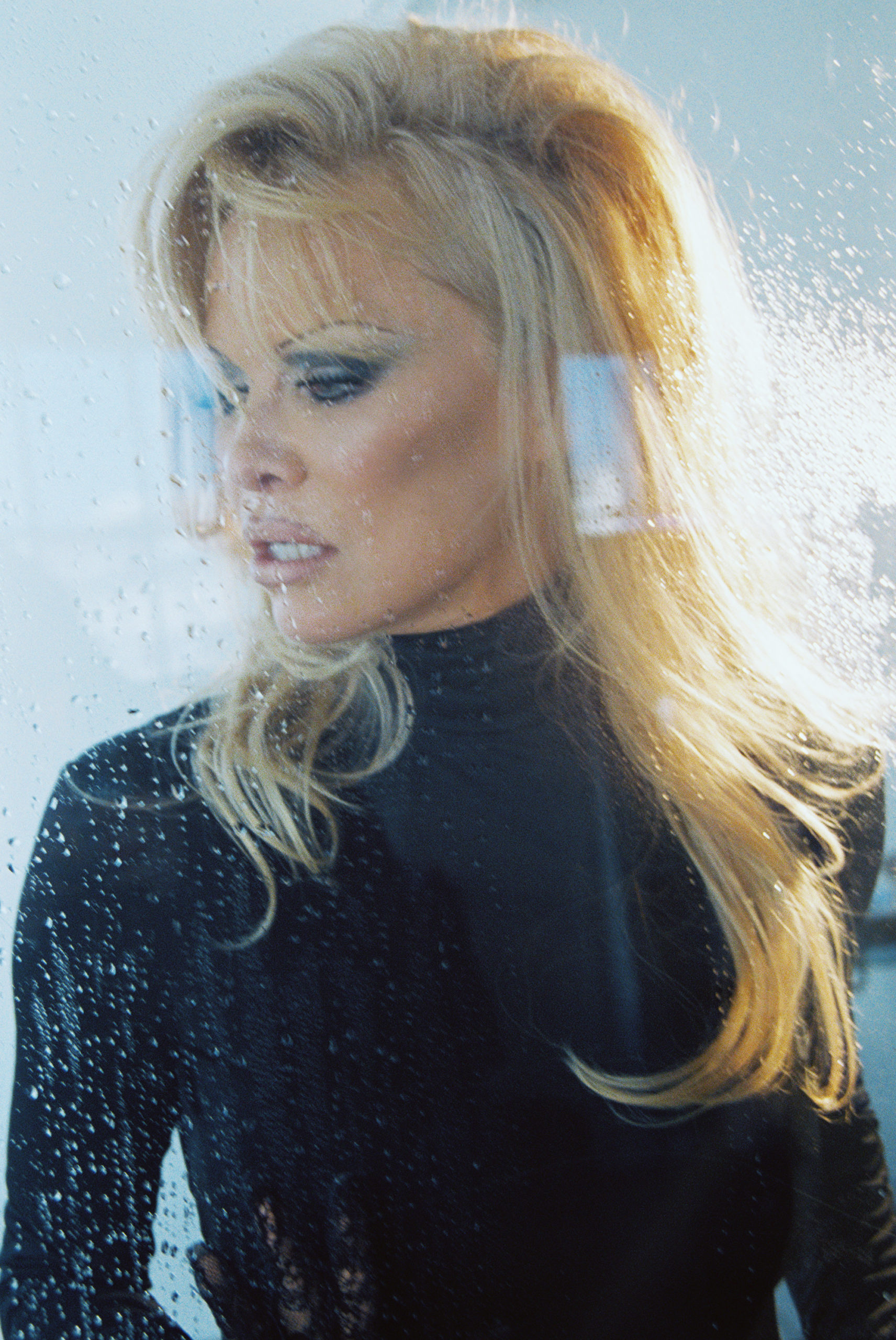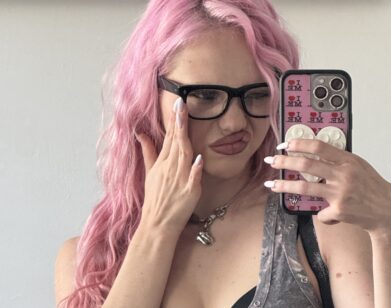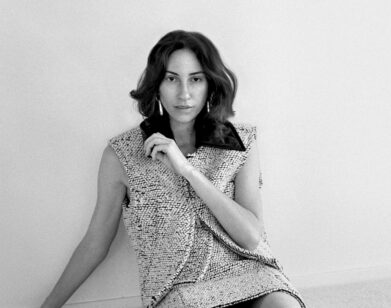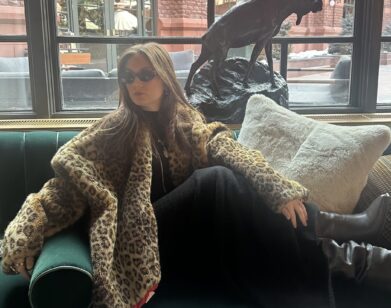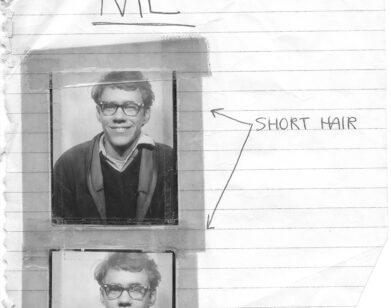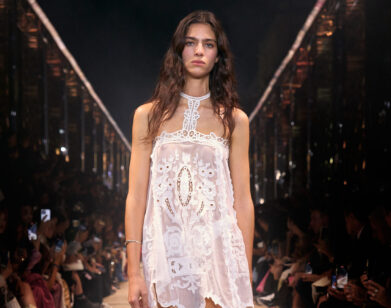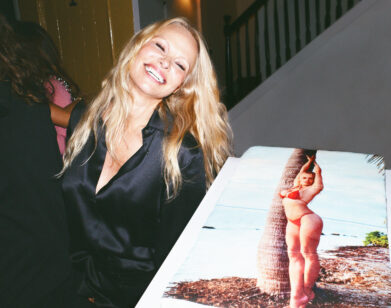icon
Pamela Anderson Tells Ronan Farrow How She Survived Hollywood
FRIDAY JAN. 6, 2023 8 AM VANCOUVER ISLAND
Midway through our conversation, Pamela Anderson name-checks the Renaissance master Titian and his “Diana and Actaeon.” The painting, one in a series of the artist’s interpretations of Ovid’s “Metamorphoses,” shows Actaeon, a male hunter, stumbling upon the virgin goddess Diana, who is bathing and naked except for a sick-as-hell bejeweled updo. The painting conjures a host of modern questions about objectification. Art historians have debated Diana’s agency, her reaction to the attention, and whether her blushing cheeks signify coquettishness or fury. Similar questions loom over the legacy of Pamela Anderson, an indelible piece of ’90s iconography who, in a surprisingly avant-garde new book and an emotional Netflix documentary, adds new dimension to a life story that has often been reductively eroticized. In our conversation, she is honest, funny, and extremely Canadian: that rare celebrity to emerge from the disorienting labyrinth of fame knowing herself more, rather than less. In a later painting in Titian’s series, showing the aftermath of the bathing scene, Diana, still baring one breast, has found her arrows. She chases Actaeon, who is now transformed into a stag and being mauled to death by his own hounds. Anderson tells me she doesn’t seek reevaluation, only catharsis, and I believe it. But, like Diana, she is, in her way, seizing control.
———
RONAN FARROW: Hey. How are you?
PAMELA ANDERSON: Good. I can see you, but you can’t see me. What the heck?
FARROW: Which I really respect. Actually, one of my pet peeves is that everybody feels very free to peer pressure one into turning the camera on during a Zoom, and now here I am doing the same thing.
ANDERSON: I mean, I look horrible, but it’s the morning so whatever.
FARROW: You look lovely.
ANDERSON: Oh, thank you. You look lovely. I was really excited that you agreed to do the interview. I feel like you and I could write a book together. I’m a case study.
FARROW: I’m flattered that you’d say that. I feel the same way. You’ve really risen above a lot and that was clear watching the documentary and reading the book.
ANDERSON: That’s what I was thinking, too. There’s so much to talk about. I don’t even know where to start. I always like to write before an interview, so I’ve already written the whole thing. I could just send it to you.
FARROW: I love that we both have our notes. We’re such preparers.
ANDERSON: Such nerds. [Laughs]
FARROW: That comes across in all of this biographical material about you. You have gotten to where you are through a lot of hard work and professionalism and it’s almost like there wasn’t space in the cultural conversation for people to acknowledge that, because there was so much outsize focus on the objectifying part of who you were publicly.
ANDERSON: Yeah. It’s been very therapeutic to write my book. Holding onto all these things as you’re going through them is very difficult. It’s a crazy business I got myself into. When I was little, I wanted to be a nun or a showgirl. Why can’t we be both?
FARROW: What was it in each of those careers that made you feel that way early on?
ANDERSON: Probably the costumes. [Laughs]
FARROW: My mom was raised very, very Catholic. I’ve looked at her childhood journals and it’s all very pious—there was a lot of her wanting to be a Carmelite nun in Africa and take care of kids. I think part of that is a martyr complex and part of it is genuine altruism. And maybe part of it was the fabulous outfits. [Laughs] You’re both performers.
ANDERSON: I didn’t grow up Catholic. When I grew up, my grandfather told me I was agnostic, that no one could tell me what to believe. But I was always really fascinated by rituals and religion and mythology and fairy tales. I was a really imaginative kid; that was my survival mechanism. I can look back now and laugh at some of the choices that I’ve made but I was just living in this heightened movie that I was creating for myself. I still don’t know what the heck I’m doing. But it’s interesting to look back and see a lifetime. I don’t know how I raised two such great kids. I mean, considering the gene pool, they’re perfect gentlemen.
FARROW: That is a reflection of who you are. You get the sense in the documentary, in those scenes with the three of you together, that you’re owed a lot of credit for the well-adjusted parts of them.
ANDERSON: They’ve seen a lot of the world. But we’ve always had such an honest relationship, which was hard for me to have in my family. Now that we’re releasing the book, sometimes I wake up and I go, “My god, what have I done?” But I needed to get that out. It was life or death. I could have been much more graphic. I could have told many more stories. I could have talked about other relationships, but there’s the denial thing, the legal thing, so you just go, “Is it even worth going there?”
FARROW: My list of questions begins with the word “honesty.” Looking at all of this old archival interview footage of you, you’re often objectified in a way that seems above and beyond what you invited professionally. You faced a really reductive and often sexist perspective in so many interviews. And yet you acquit yourself with such grace in those conversations, partly because you have a sense of humor about it. But it struck me that those exchanges hold up well because you are so radically honest. Even from very early in your career, when you’re quite young and you’re dealing with a lot, you have a sense of maturity and wisdom. I wonder where that originated in you?
ANDERSON: I think when you have nothing to lose, you can be honest. I’m not a bad person, anything that I say or do is coming from a good heart. I’ve always known that, but I didn’t have anybody to ask, “How do you handle these things?” I was dealing with it on my own, doing the best I could.
FARROW: Your life in the public eye is often defined by scandal. In the documentary you talk about the recent scripted series triggering all of that again. It’s something that I have a little personal insight into because I grew up in the crucible of a sex scandal, wanting it to go away for years after, and yet witnessing it resurge and resurge. You have written about your sons proposing the idea of this book. What made you do it?
ANDERSON: My sons were huge instigators. They really wanted me to tell my story. And they didn’t even know all the gritty details. They obviously were very affected by the tape being stolen and my divorce from Tommy [Lee]. But they just said, “Mom, no one knows you, and they think they do.” That doesn’t sit right with them. Obviously, they’ve been raised by me, so they realize I’m honest to a fault and that it might be an interesting and possibly inspiring story. So they supported me 100 percent. I haven’t even seen the documentary. It’s not that I don’t want to, but the tiny bits that I’d seen from Ryan [White, the director of Pamela, A Love Story] showing me when we found all these archives, they just leveled me. I’m going to watch it one day, because I’m very proud that my sons were involved in it and I want to see their interviews. But it’s too hard for me to see it at this point. With my book, I just need to get through this next month and see how it’s accepted. If it’s not, that’s okay. If it is, that’s okay. But I just want to take a little break from it all and see what’s next. It’s a big mystery.
FARROW: What was the writing process like? You’ve actually written a surprising number of books in different genres: kids’ books, poetry. You’ve been very open about working with ghostwriters and collaborators in the past.
ANDERSON: There were two old books that I had nothing to do with. Basically, I told a little bit of my story to somebody and then we made these storylines. But from a very young age, I was known for my creative writing. So when we talked about this project, I said I’m writing this myself and my book agent was like, “You’re going to need somebody to help you write this proposal.” I said, “Just give me a chance to do it.” And so it was a 60-page poem and we showed it to some publishers who said that they loved my unique writing style but wanted to put me with somebody. I said, “Just give me a couple months.” I started writing and they started getting more and more confident in me. Finally, I wrote the book just with an editor, which was fantastic. Every word is my word. There’s no collaborator, there’s no ghostwriter.
FARROW: It’s very visibly you in the book. One thing that interested me was the amount of poetry you include. Talk to me about that.
ANDERSON: Poetry is a good facade. It’s very revealing and very vulnerable but it just seems to be more free. I wrote my whole book like that. And they’re like, “We need to put this into sentences and paragraphs and have a little bit of a timeline.” That’s where an editor helped me. I didn’t even realize I was writing poetry. Even when I would write world leaders about animal issues it would say, “Pamela’s written this long poem to this prime minister.” I didn’t realize it was a poem. I was just writing a letter. I’ve always had that natural instinct.
FARROW: The free-form poetic parts of this book are some of the most interesting. Part of being a creative person is taking the good advice of people around you, but for you it might be liberating to lean farther into that less structured format.
ANDERSON: I would love to. I’ve got stacks of yellow legal pads and I just scribble and write. I really enjoy it. When I’m writing, I know I’m in a good place.
FARROW: You talk in the book and in the documentary about multiple incidents of sexual assault you experienced as a child and carrying shame from those experiences. Has the process of writing, and confronting those parts of your history, been healing in the way that you hoped?
ANDERSON: I feel a little sick to my stomach, to tell you the truth. My mother has read it. It hurts people and I’m sorry for that. But I needed to look at my life from beginning to end. The one fortunate thing about being in the public eye is that I’m able to tell my story, and hopefully it’s inspirational to people. Especially with childhood trauma, you carry that with you, especially when you’re raised in a place where everyone just wants to put it aside. I remember lining up in the bank and saying, “Look mom, that’s the guy that raped me.” And she went, “Shh.” It was like, “Don’t say anything, don’t embarrass me.” I think a lot of our troubles we’re having in society are about unheard trauma. We need to tell our stories. And I hope that’s encouraging. Even my mom, when she read it, she started acting out, just jabs and cruel remarks. It was coming out in all sorts of different ways. Right now, talking to you, I’m vibrating. It’s an energetic, positive thing, but it’s not easy. You have to be brave to fall in love, you have to be brave to speak your truth. I think everyone needs to try to live that way.
FARROW: There is real public service in radical honesty about painful and stigmatized experiences. I, in my public life, have had to grapple with some of these questions of do I want to outrun the most painful things in my history or do I want to confront these issues and hopefully draw strength from them?
ANDERSON: You have to double down on you. Life is so fleeting. The planet was here billions of years ago, it’s going to be here billions of years after us. What are we here for? Pain and suffering is part of life. It’s what creates a beautiful song or a beautiful movie. Anger and sadness are just as important as happiness. That’s what I’ve taught my kids, too. And gosh, I’m not one to give advice on relationships because I haven’t seemed to be able to figure that out, and I don’t even want another relationship. [Laughs] I’m good alone. Humans are interesting people and we’re flawed. That’s just the way it is.
FARROW: In the book you write about being a punchline or a caricature in the ’90s, and the documentary shows clips of how you, with considerable mastery, handled offensive comments. You’re one of those people who’s a lens through which we can view a moment in our cultural history and it doesn’t always look pretty. Do you feel like through this telling of your own story, you are successfully broadening how people see you?
ANDERSON: That’s not the goal, but looking back on those times, I wasn’t thinking, “Oh, these men are sexist.” I didn’t really know what that meant. I was just thinking, “Oh my gosh, I’m here in this industry, this is how it works. I was in Playboy, so maybe I deserve it.” I was coming from a much more innocent place. I wasn’t stupid—naive maybe—but I had a pretty strong sense of self. I always felt that when I was older I would recognize myself, that I just had to get through that time. My first plane ride was to Los Angeles—I was in Playboy, then Baywatch and these different TV shows, then I got married and had babies. It was a confirmation of how I thought about myself, how I could get through anything. But I really understood that I had to feel my feelings, even at the lowest points. I didn’t know that I was going to do anything more than Playboy. I didn’t know if I was going to go back home and be a waitress. So when people say, “How did you choose this job?” Or, “How did you choose this man?” It’s like, they chose me. I was just living every day and trying to survive.
FARROW: There are shocking scenes in this book chronicling you watching your dad hurt your mom as a child and then much later in your life, the moment of Tommy throwing you and 7-week-old Dylan into a wall and getting arrested. Do you feel like you have pulled something from the retelling of those experiences that is helpful to you in escaping that intergenerational cycle of brutality?
ANDERSON: That’s why in doing this, I need to stop the cycle. My mother had her issues at home, my father had his issues at home. His father was violent with him, my mother’s father was violent. It’s got to stop. People will be angry with me, but they’re really just angry at themselves. And so this is my Hail Mary. I have a lot of other things I want to talk about too, but this is the most important thing I can share: how to be brave enough to tell your story. What’s the worst that could happen?
FARROW: How have you used that trauma we’ve been talking about to inform how you’ve raised your sons?
ANDERSON: I was very, very protective without having them feel like they were being overprotected. We didn’t have nannies, I didn’t have babysitters, I only trusted my family around my kids. At their elementary school I even hired somebody that was an assistant coach who was really security because I needed to know that they were okay. Because one time someone tried to take Dylan off the playground. I stopped him and I took Dylan and I looked at this guy. He had been living in the bushes close to the school and he had a whole encampment made of pictures of me. He had People magazine in his hand and he was looking for my son because he had seen a picture of him. I didn’t grow up in a public family so I had to learn quickly how to keep them safe without them feeling like they were any different than anybody else.
FARROW: I sadly see more kids who grow up in the public eye and emerge from that experience with profound struggles because of it, than ones who emerge drawing strength from it.
ANDERSON: That was part of my decision to put them in a boarding school in Canada, on Vancouver Island. I live just a half an hour away from it right now. I knew they needed some good Canadian roots. They needed to get out of the Malibu Colony and get some reality, and it was the best thing that we ever did. Even though it was very difficult at the time, they agree now and they’ve said that they’ll send their kids to the same schools. It gave them independence, it showed them this hierarchy between boys and men and good examples and consistency. That was another reason why I sent them here, for safety reasons, but also to get something that I couldn’t supply them with. I was getting remarried, try- ing to put that family unit back together. And it was just getting worse, it wasn’t getting better.
FARROW: So often when I have conversations about raising kids in the public eye, that is the answer, or at least one of the answers: just taking them as far from that context as possible.
ANDERSON: Yeah, that doesn’t solve everything but it’s helpful, especially as a single mom. We were so close and I was here a lot. There’s something about a boy at 13 years old with a mother. There has to be some kind of detachment, as hard as it was on both of them. I just felt like, yes, we do get unhealthy attachments to our parents. We’ve got to get out of the way sometimes and we’ve got to have enough faith in that child to start making their own way.
FARROW: Is there anything you wish you could say to yourself as a child?
ANDERSON: What I would tell my- self as a young girl is just that I’m going to get through it. That’s the great exercise—trying to picture yourself at 5 years old. You look at that 5-year-old person from head to toe and observe them for a second, then call them over and give them a hug and tell them they’re going to be okay. The first time I did that, I was in tears because that’s all we really need at that age: love, acceptance, being told everything’s going to be okay. I didn’t have that. Sometimes I wonder why. I hate to say it without being awful to my parents, but why do we have children if we can’t give them that kind of security?
FARROW: Do you feel you’ve found that kind of emotional security in life or are you still searching for it?
ANDERSON: I’m still working on it, and it’s part of my process. I’m just going to keep being me. Like I said, there’s so much mystery right now. This is a very open, vulnerable time. You learn not to be bitter. You have to be able to stay open and take whatever comes and hopefully, it just gets kinder and kinder.
FARROW: You discuss this in both the documentary and the book, and it really does strike me that you have remained openhearted and optimistic.
ANDERSON: It’s a practice. [Laughs] This is the first time in my life I’m thinking I need to love myself before I can love anybody else. Also, the capacity to be alone is the capacity to love, like that great Osho quote says. We don’t make other people responsible for our happiness. That way, if they come or they go, it’s not a bad thing. I’ve had to learn a lot and I feel strong, safe, and like I’m living a really romantic life. It doesn’t always have to be for somebody else. I don’t know what the future holds, but I’m living my dream the way I want to, and it’s just me and the dogs. [Laughs]
FARROW: Some of your poetry, in this book and beyond, has such interesting subtextual moments. A lot of it is open to interpretation. In one poem, from your earlier book, Raw, you write:
Life is sensual—not a “fix it in post”—ME—I miss PLAYBOY—
The End of an Era—
Chivalry, elegance—
Celebrated imperfections—
differences … hot—passionate dreamy scenes…
The girl next door—shyness—“it’s my first time”
but—not my last … (wink)
—I’m planning a mysterious coup—
Want to get in on it—
Julian Assange?
ANDERSON: [Laughs] That’s how I met Julian. Well, Vivienne Westwood introduced me to Julian.
FARROW: I’m sorry for your loss. I saw that you were close with her.
ANDERSON: Very close. She introduced me to Julian and the first thing Julian said when I met him was, “Why am I in a poem of yours?”
FARROW: And what is the answer?
ANDERSON: I felt like he’s this radical thinker, a truth seeker and an authentic and brave person. So his name just came up. I see a lot of imagery when I talk. Right now, I’m thinking of Titian’s “Diana and Actaeon” in the National Gallery. I have Stravinsky playing in the background. I’ve got soundtracks in my mind. If I write my thoughts, it comes out like what you just read.
FARROW: Do you consider Assange to be a journalist? And how do you respond to the arguments from people who say he’s endangered the lives of American service people, because he abetted the exfiltration of that information and released it in an arguably undisciplined way?
ANDERSON: Well, I believe he’s a journalist. So do the people that I’m close to—Srećko Horvat, [Slavoj] Žižek, Yanis Varoufakis, Noam Chomsky. And Vivienne, she introduced me to all these people that support him. I felt like my connection to Julian was the human one. The people that visited him were lawyers and intellectuals. I went there and brought him a vegan meal and we talked about avocados and the Bible and jealousy, or drew maps together. We had a close connection and he even said that I was the only person he’s ever trusted. I think it’s been proven that he hasn’t put anybody in harm’s way. His job was to publish what came to him without any bias. His intention was to expose all that information so everyone could make a choice instead of just watching CNN or Fox News.
FARROW: Regardless of one’s thoughts on Assange, it’s certainly inarguable that you have dug in deep on this issue of press freedom. What is it about that issue that draws you to it?
ANDERSON: I remember when I was getting a lot of attention for very superficial things. I was like, “What can I share to make this attention more meaningful?” That’s where it started, my activism career. I was learning about animal experimentation, so I helped create animal welfare laws where there were none. I was speaking to world leaders all of a sudden. I was talking to people that most people couldn’t get access to. Also, I had Hugh Hefner. He was a great proponent of free speech and freedom of the press and human rights. It just all morphed together.
FARROW: In the documentary you’re very poignant about Tommy, but he doesn’t appear. Was he ambivalent about it? Is there a reason he is not in it?
ANDERSON: Well, you’d have to ask Brandon. [Laughs] I think Brandon and Dylan [her sons] are the only interviews.
FARROW: They’re certainly the backbone, narratively.
ANDERSON: I’ve spoken to Tommy a few times. It’s always cordial and we ramble to each other sometimes and I can tell we miss each other’s voice. But he’s moved on. He has a wife. And the last thing I want to do is be disruptive in anyone’s life. Not that I could be. They’re probably like, “Oh god, here she goes again.” But it’s part of my story.
FARROW: You’re very respectful of him. We actually see your reaction to your family members watching the Hulu series. What did it feel like, having that come out? Have you watched it at all?
ANDERSON: I was so angry that I didn’t watch it. Just the way they played us, Tommy and I, very bimbo-y, very shallow. I remember finding out about it and I thought, “Are they going to bring this up again?” I had already decided I was doing a documentary. This wasn’t an answer to that. It just made it seem even more meant-to-be.
FARROW: You surely have encountered promotional clips. Do you have any take on Lily James’s portrayal of you?
ANDERSON: It was a job for her. I just saw the pictures. And it’s just funny. It’s like seeing a Halloween costume. I think if you’re a Halloween costume, you’ve made it.
FARROW: What a strange experience, to be such a potent piece of cultural iconography that a celebrated actress of the moment is spending hours getting prosthetics put on to look like you.
ANDERSON: That’s just crazy. I actually feel rooted for. I just played Roxie in Chicago on Broadway. It was such a profound moment. On the first night, when the standing ovation started, just to look out and see my kids in the front row looking at me with such pride, I fell into tears. I needed to get that out. I think between doing Broadway and writing this book, it’s really saved my life. I needed to do something of substance, something I was proud of. I didn’t know if I could sing, I didn’t know if I could dance, I didn’t know if I could act, but put it all together, and I did it. It was crazy.
FARROW: Watching the clips of you in Chicago, I was struck by what a good comedic actress you are, how strong your timing is, how poignant you are singing those numbers. You talk briefly in the film about having wanted to be a serious actress. How would you see yourself absent that cartoon image of you?
ANDERSON: Well, if I could survive financially and be an artist, that’s what I would love to do. I’d be a glassblower. I would be making paintings and—
FARROW: Goddamn, Pamela, of all the answers, I was not expecting glassblower.
ANDERSON: [Laughs] I would be doing something creative, just having fun. Maybe I can say that my life was an art project. I was a performance artist. I left a mark.
FARROW: The spirit of honesty that runs through so much of your public life has sometimes blown up in your face a little bit. You faced a lot of criticism, in the midst of #MeToo reporting that was coming out in the last several years, when you suggested women need to protect themselves a little more. You told Megyn Kelly, “You know what you’re getting into when you go to a hotel room alone.” Do you feel like that was a healthy thought to introduce into the dialogue at that point?
ANDERSON: I could even take it a step further. My mother would tell me—and I think this is the kind of feminism I grew up with—it takes two to tango. Believe me, I’ve been in many situations where it’s like, “Come in here little girl, sit on the bed.” But my mom would say, “If someone answers the door in a hotel robe and you’re going for an interview, don’t go in. But if you do go in, get the job.” That’s a horrible thing to say but that’s how I was. I skated on the edges of destruction, I just had this sense of value and self-worth. But I think a lot of people don’t have that or they weren’t taught that. Thank god for the #MeToo movement because things have changed and people are much more careful and respectful.
FARROW: Looking back at all of this, to what extent do you feel this cartoon image of you that we’ve talked about was an act of self-creation on your part? And to what extent do you feel like that was something that was foisted on you without agency?
ANDERSON: I’m to blame. [Laughs] I created a character, and it fed the monster. So I don’t feel like a victim. I feel fortunate.
FARROW: When you talk about it with that sense of agency and ownership, it almost reminds me of the cultural conversation around drag and how it’s evolved in recent years and had a renaissance where it is being recognized by an increasingly mainstream audience as something beautiful.
ANDERSON: Well, RuPaul has that great expression, “We’re all born naked, everything else is drag.” [Laughs]
FARROW: Right.
ANDERSON: Trying to be beautiful,
trying to be accepted, trying to be loved, trying to have people like you, all those things play into how you present yourself to the world. I was getting attention. People loved me. I had rock stars chasing me. I was like, “Wow, I really tapped into something and got more than I asked for.” [Laughs] It’s funny to look back on. It almost feels surreal. It’s like time is an illusion and we’re talking about this other person, but that was me.
FARROW: How do you keep from losing your sense of self as you engage in that performance art, playing that heightened version of you?
ANDERSON: You don’t want to put that kind of pressure on your kids, but my kids did save me. I really wanted to be a mother and I want- ed to be there for them. Getting the kids out to school, I’d catch my reflection and go, “Oh my god, I’ve got glitter and mascara down my cheeks and people are judging me.” But I’m judging their cars with peanut butter sandwiches stuck on the floor. We were all a mess. I had this conversation with Julian’s mom. She said, “Pamela, you need to stop with these sexy pictures and you’ll be taken more seriously as an activist.” And I thought, “What have we been fighting for?” Why can’t we be sexy and smart?
FARROW: Yes.
ANDERSON: Why can’t I be a nun and a showgirl?
FARROW: And that’s a radical idea. That continues to be an idea that needs nurturing in the public consciousness. So I think there is a lot to learn from your legacy.
ANDERSON: It’s fun now because I’m on my little ranch with my dogs. I don’t wear makeup. I just wake up and throw on a slip and my rain boots and walk through the field and get into the ocean. I feel like I’ve just gone right back to the little girl that lived here before. Sometimes I say I have regrets and sometimes I don’t. I’m just happy my kids turned out great and, like I said, I’m not looking for respect or to be taken seriously. I just hope to inspire people that have gone through traumatic times to try to make lemonade out of lemons. That’s a great expression.
FARROW: I admire that you have that centeredness. It’s especially an unusual thing to encounter in people who have grappled with fame and its ups and downs. I don’t want to fit into the long history of male journalists asking you about the specifics of your love life, so I’m specifically not going to, but I did want to ask how this quality of being a sex symbol has informed your dating over the years.
ANDERSON: Well, it brought a lot of interesting attention. With Tommy and I, we had such a wild and romantic passion-fueled life. And then everybody else just paled in comparison. Literally, Tommy put full armor on and would ride in on a horse.
FARROW: I saw that.
ANDERSON: As a little girl, I was really into fairy tales. My father wrote poetry to my mother. As volatile as they were, they were always very romantic. We always felt in the way of their relationship be- cause it was so passionate. So I guess I took a little bit of that. Little bits of your whole life, you take into your future, and I think I was in this still–fantasy-fueled lifestyle and it took my kids to get my feet on the ground and realize, “Okay, now I’m trying to recreate a family unit.” With dating, there’s some wild stories. My mother would say, “No one’s ever going to love you for the right reasons because you’ve painted this picture of yourself that’s unlovable.” She would also say, “You can’t make more money or be more popular or be more successful than a man in your life because you’ll emasculate them and you’ll never have any good sex.”
FARROW: How much do you believe in what your mother told you?
ANDERSON: There is some wisdom in some of it, but times have changed.
FARROW: A lot of Americans who know you from Baywatch or as a centerfold might be surprised watching this documentary, experiencing this book, by your Canadianness. How do you feel about living there again, after all this time?
ANDERSON: I love my garden. I love walking in the ocean. These are the trees I grew up with. I’m retracing the steps of my childhood, literally. And I get to be a little girl again.
FARROW: Do you plan to stay in Canada?
ANDERSON: Well, this will be my sanctuary, the place I always return to. But I love to be out there in the world. I love to travel. During COVID, everybody stayed where they were and I got a little restless. Something’s pulling me. What’s that great expression? Anaïs Nin said, “I’m restless … My hair is being pulled by the stars again.”
———
Hair: Rob Talty using R+Co at Forward Artists
Makeup: Kali Kennedy at Forward Artists
Manicure: Natalie Minerva using Opi at Forward Artists
Set Design: Nick Des Jardins at Streeters.
Production Director: Serie Yoon
Production: Michaela Mcmahon-Dunphy
Production Coordinator: Karmel Steven.
Photography Assistant: Juliet Lambert
Fashion Asssistants: Hayley Francise and Angelica Asimakopoulos.
Production Assistant: Keon Morgan

